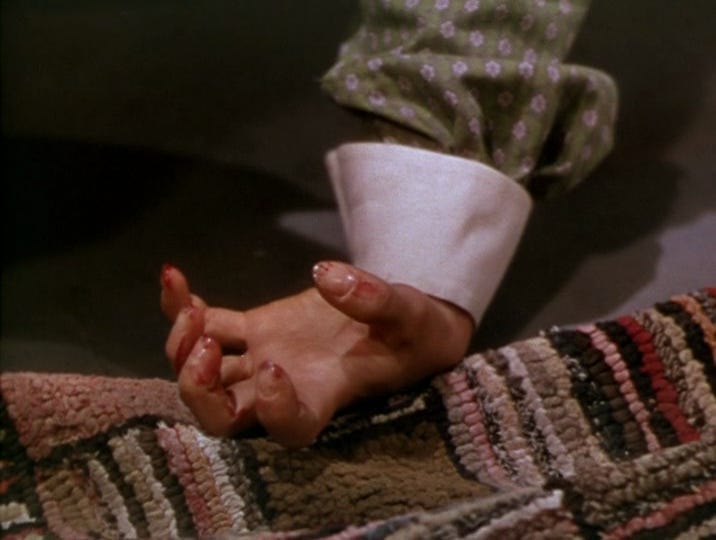Rancho Notorious (1952)
Some words on Fritz Lang in the underworld, way out West.
Some words scratched out in a bare tenement room, across from a movie house and under a yellow bulb, on a cold night a long time ago:
“She’s right there on the floor right in front of you and she’s got blue, blue eyes, you feel ‘em staring at you? You see the blood on the floor? You hear her screaming!?”
There’s a scream and a gunshot and a boy across the street who looks up from his game. He gets shot at, too, but not hit. But “she wasn’t spared anything.” He’s already put on a gun before you see her hand, frozen stiff in a rictus claw, with blood under every nail. The two images mean the same thing. Later, many years before, Marlene pauses and carefully lifts her voluminous dress to step over puddle of muddy water. The camera pans down to show you this. You’re supposed to notice it. It’s important. It’s on a soundstage, like nearly every other scene, but here, unavoidably, the filth is real. And despite her best efforts, Marlene’s hem trails through it. She looks cleaner when she first meets him later, dressed in grease and dust and blue jeans, but it’s just another kind of make-up. “Come back ten years ago,” she tells him still later. You understand what she means.
Our hero is our hero because he claims the low card when he gets a high one, because everything he does drives him towards his own death. This is what a hero is, when you strip him to the bone (and such a vivisection was old Fritz’s favorite hobby). He’s like Orpheus in the underworld, except he knows his Eurydice is lost forever. The sheriff turns back at the stream where his jurisdiction ends, but he crosses it like the River Styx. His muses are Hatred, Murder, and Revenge, but before you judge him too harshly, look around: everyone else in this world is a slave to Love or Money, and those are far more dangerous passions. He kills a man without really meaning to. It doesn’t seem to upset him. Maybe he wanted to. Maybe it felt good. “He’s suffered lacerations, contusions, and concussion. His jugular vein is severed in three places. I counted four broken ribs and there was a compound fracture of the skull. To put it briefly, he’s real dead.” For doing this our hero is given $300. He didn’t know his victim.
“Don’t fret, gentlemen. It won’t be the first time they’ve hung a few crooked politicians. It’ll only take a minute or two. It’s a clean way to die, and as quiet as eating a banana.” The 20th century in miniature: three men sit in a jail cell and wonder if they’re going to die, and you wonder if they deserve it. Their jailers wear armbands but their brand of whiskey is full of lockpicks. You only spend long enough in their town to be glad it isn’t your town, or maybe it is, or was. In America the atrocities often predate the cities, so it’s hard for you to say. You have to read it in the wind, or sometimes in the eagerness of the sky to run away from the horizon, and this isn’t a world with any of those things. There’s less air to breathe every day. “Look around you, Altar Keane. What do you see in there, a bedroom or a morgue? Through that window, what’s that, a courtyard or a graveyard?” It’s both.
This piece was first published on le remords January 8th, 2021, in essentially identical form.


